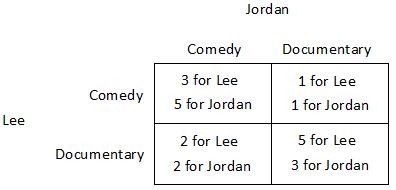Economists know that if consumers and producers are both made better off, they would be without free exchange because the exchanges are
A. able to make producers better off by an amount that compensates consumers for their losses.
B. able to make consumers better off by an amount that compensates producers for their losses.
C. voluntary.
D. mandated by government.
Answer: B
You might also like to view...
Paper money in the U.S. is: a. fiat money
b. more than half of M2. c. only partially backed by gold and silver in Fort Knox. d. convertible into specie (gold or silver) at the holder's request.
Suppose Jordan and Lee are trying to decide what to do on a Friday. Jordan would prefer to see a comedy while Lee would prefer to see a documentary. One documentary and one comedy are showing at the local cinema. The payoffs they receive from seeing the films either together or separately are shown in the payoff matrix below. Both Jordan and Lee know the information contained in the payoff matrix. They purchase their tickets simultaneously, ignorant of the other's choice. Which of the following statements is true?
Which of the following statements is true?
A. The lower-left cell is the only Nash equilibrium. B. Both the lower-left and upper right cells are Nash equilibria. C. The upper-right cell is the only Nash equilibrium. D. Both the upper-left and lower-right cells are Nash equilibria.